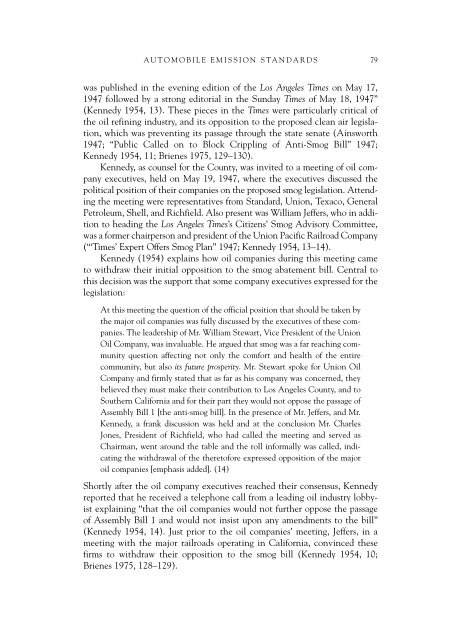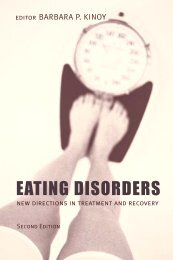AUTOMOBILE EMISSION STANDARDS 79was published in the evening edition of the Los Angeles Times on May 17,1947 followed by a strong editorial in the Sunday Times of May 18, 1947”(Kennedy 1954, 13). These pieces in the Times were particularly critical ofthe oil refining industry, and its opposition to the proposed clean air legislation,which was preventing its passage through the state senate (Ainsworth1947; “Public Called on to Block Crippling of Anti-Smog Bill” 1947;Kennedy 1954, 11; Brienes 1975, 129–130).Kennedy, as counsel for the County, was invited to a meeting of oil companyexecutives, held on May 19, 1947, where the executives discussed thepolitical position of their companies on the proposed smog legislation. Attendingthe meeting were representatives from Standard, Union, Texaco, GeneralPetroleum, Shell, and Richfield. Also present was William Jeffers, who in additionto heading the Los Angeles Times’s Citizens’ Smog Advisory Committee,was a former chairperson and president of the Union Pacific Railroad Company(“‘Times’ Expert Offers Smog Plan” 1947; Kennedy 1954, 13–14).Kennedy (1954) explains how oil companies during this meeting cameto withdraw their initial opposition to the smog abatement bill. Central tothis decision was the support that some company executives expressed for thelegislation:At this meeting the question of the official position that should be taken bythe major oil companies was fully discussed by the executives of these companies.The leadership of Mr. William Stewart, Vice President of the UnionOil Company, was invaluable. He argued that smog was a far reaching communityquestion affecting not only the comfort and health of the entirecommunity, but also its future prosperity. Mr. Stewart spoke for Union OilCompany and firmly stated that as far as his company was concerned, theybelieved they must make their contribution to Los Angeles County, and toSouthern California and for their part they would not oppose the passage ofAssembly Bill 1 [the anti-smog bill]. In the presence of Mr. Jeffers, and Mr.Kennedy, a frank discussion was held and at the conclusion Mr. CharlesJones, President of Richfield, who had called the meeting and served asChairman, went around the table and the roll informally was called, indicatingthe withdrawal of the theretofore expressed opposition of the majoroil companies [emphasis added]. (14)Shortly after the oil company executives reached their consensus, Kennedyreported that he received a telephone call from a leading oil industry lobbyistexplaining “that the oil companies would not further oppose the passageof Assembly Bill 1 and would not insist upon any amendments to the bill”(Kennedy 1954, 14). Just prior to the oil companies’ meeting, Jeffers, in ameeting with the major railroads operating in California, convinced thesefirms to withdraw their opposition to the smog bill (Kennedy 1954, 10;Brienes 1975, 128–129).
80THE POLITICS OF AIR POLLUTIONThe bill was approved in the state Senate by a vote of twenty-nine tozero and was promptly signed by the Governor. It led to the creation of theLos Angeles Air Pollution Control District (APCD), established with a budgetof $178,000. As one historian of U.S. air pollution politics explains, thismade it the “best funded air pollution control agency in the nation” (Dewey2000, 44). Between the years 1948 and 1957 the APCD expended nearly $10million on pollution control efforts (Dewey 2000, 57).THE INITIATION AND FORMULATION OFCALIFORNIA’S AUTOMOBILE EMISSION REGIMEDespite the work of the APCD (Brienes 1975, chaps. 6 and 7), air pollutioncontinued to be a persistent, if not worsening, problem in the late 1940s andearly 1950s (Air Pollution Foundation 1961, 7; Carlin and Kocher 1971, 57;Krier and Ursin 1977, 72). A particularly egregious five days of heavy smogin Los Angeles during the fall of 1953, known as the “five-day siege ofsmog,” prompted locally oriented economic elites and the automotiverelated industries to create a policy-planning organization, the Air PollutionFoundation (Air Pollution Foundation 1961, 8; Krier and Ursin 1977, 83).The Foundation board of trustees was composed almost entirely of representativesfrom business and industry. Many of these individuals representedfirms whose future, in part, depended upon continued economic growth inLos Angeles. Among these locally oriented firms were the Southern CaliforniaGas Company, Bank of America, Broadway-Hale Stores (departmentstores), Western Air Lines, California Federal Savings, California Bank,Southern California Edison Company, Security-First National Bank, andBullock’s (department stores). Among the automotive-related firms representedon the Foundation’s board were each of the Big Three automakers,Firestone Tire & Rubber Company, U.S. Steel, and the Union Oil Company(Air Pollution Foundation 1961, 50–51). The Foundation’s list of contributorsdemonstrates the broad support that it enjoyed throughout the corporatecommunity. Throughout its seven-year existence (1954–1961) theFoundation had more than 200 donors, almost all of which were from corporateAmerica. Among its financial supporters were the Automobile ManufacturersAssociation, the Western Oil and Gas Association, the Los AngelesNewspaper Publishers Association, the Los Angeles Clearing HouseAssociation (made-up of major California banks), DuPont, Bechtel Corp.(construction), Kaiser Steel, and the Goodyear Tire and Rubber Company(Air Pollution Foundation 1961, 53–56).The Foundation sought “to assemble a competent technical staff to organizeand direct a broad program of cooperation, research, and public information”on the issue of smog in southern California. Additionally, the Foundationplanned to “determine what remains to be done and to employ
- Page 2:
The Politics of Air Pollution
- Page 7:
ContentsAcknowledgmentsviiONELocal
- Page 12 and 13:
LOCAL GROWTH COALITIONS 3tion, such
- Page 14 and 15:
LOCAL GROWTH COALITIONS 5how the U.
- Page 16 and 17:
LOCAL GROWTH COALITIONS 7growth (Ta
- Page 18 and 19:
LOCAL GROWTH COALITIONS 9In this pe
- Page 20 and 21:
LOCAL GROWTH COALITIONS 11ity tend
- Page 22 and 23:
LOCAL GROWTH COALITIONS 13In the ar
- Page 24 and 25:
LOCAL GROWTH COALITIONS 15who reduc
- Page 26 and 27:
LOCAL GROWTH COALITIONS 17cally mod
- Page 28 and 29:
TWOPolitical Economy and thePolicym
- Page 30 and 31:
THE POLICYMAKING PROCESS 21moves to
- Page 32 and 33:
THE POLICYMAKING PROCESS 23eral gov
- Page 34 and 35:
THE POLICYMAKING PROCESS 25groups
- Page 36 and 37:
THE POLICYMAKING PROCESS 27Given in
- Page 38 and 39: THE POLICYMAKING PROCESS 29tions, t
- Page 40 and 41: THE POLICYMAKING PROCESS 31the Conf
- Page 42: THE POLICYMAKING PROCESS 33lars 199
- Page 45 and 46: 36THE POLITICS OF AIR POLLUTIONCOAL
- Page 47 and 48: 38THE POLITICS OF AIR POLLUTIONa go
- Page 49 and 50: 40THE POLITICS OF AIR POLLUTIONrush
- Page 51 and 52: 42THE POLITICS OF AIR POLLUTIONattr
- Page 53 and 54: 44THE POLITICS OF AIR POLLUTIONScot
- Page 55 and 56: 46THE POLITICS OF AIR POLLUTIONthe
- Page 57 and 58: 48THE POLITICS OF AIR POLLUTIONcrit
- Page 59 and 60: 50THE POLITICS OF AIR POLLUTIONwhen
- Page 61 and 62: 52THE POLITICS OF AIR POLLUTIONin t
- Page 63 and 64: 54THE POLITICS OF AIR POLLUTIONThe
- Page 65 and 66: 56THE POLITICS OF AIR POLLUTIONfirm
- Page 67 and 68: 58THE POLITICS OF AIR POLLUTIONinno
- Page 69 and 70: 60THE POLITICS OF AIR POLLUTIONThe
- Page 71 and 72: 62THE POLITICS OF AIR POLLUTIONFHA
- Page 73 and 74: 64THE POLITICS OF AIR POLLUTIONgone
- Page 75 and 76: 66THE POLITICS OF AIR POLLUTIONPres
- Page 78 and 79: FIVEThe Establishment ofAutomobile
- Page 80 and 81: AUTOMOBILE EMISSION STANDARDS 71ext
- Page 82 and 83: AUTOMOBILE EMISSION STANDARDS 73Ano
- Page 84 and 85: AUTOMOBILE EMISSION STANDARDS 75the
- Page 86 and 87: AUTOMOBILE EMISSION STANDARDS 77thr
- Page 90 and 91: AUTOMOBILE EMISSION STANDARDS 81exp
- Page 92 and 93: AUTOMOBILE EMISSION STANDARDS 83acc
- Page 94 and 95: AUTOMOBILE EMISSION STANDARDS 85Thu
- Page 96 and 97: AUTOMOBILE EMISSION STANDARDS 87A n
- Page 98 and 99: SIXDemocratic Ethics,Environmental
- Page 100 and 101: DEMOCRATIC ETHICS 91At the core of
- Page 102 and 103: DEMOCRATIC ETHICS 93senior attorney
- Page 104 and 105: DEMOCRATIC ETHICS 95ments mount cha
- Page 106 and 107: DEMOCRATIC ETHICS 97frameworks, as
- Page 108 and 109: DEMOCRATIC ETHICS 99mobiles and gas
- Page 110 and 111: DEMOCRATIC ETHICS 101the ecological
- Page 112 and 113: CONCLUSIONPolitical Power andGlobal
- Page 114 and 115: CONCLUSION 105quality became manife
- Page 116: CONCLUSION 107lation, the U.S. econ
- Page 119 and 120: 110THE POLITICS OF AIR POLLUTIONCHA
- Page 121 and 122: 112THE POLITICS OF AIR POLLUTION6.
- Page 123 and 124: 114THE POLITICS OF AIR POLLUTION4.
- Page 126 and 127: BibliographyAcher, Robin. 2001. “
- Page 128 and 129: BIBLIOGRAPHY 119Brienes, Marvin. 19
- Page 130 and 131: BIBLIOGRAPHY 121Cole, Luke W., and
- Page 132 and 133: BIBLIOGRAPHY 123——— . 2002. W
- Page 134 and 135: BIBLIOGRAPHY 125——— . 1975.
- Page 136 and 137: BIBLIOGRAPHY 127Hayward, Clarissa R
- Page 138 and 139:
BIBLIOGRAPHY 129——— . 2001. E
- Page 140 and 141:
BIBLIOGRAPHY 131——— . 1988.
- Page 142 and 143:
BIBLIOGRAPHY 133Perez-Pena, Richard
- Page 144 and 145:
BIBLIOGRAPHY 135Runte, Alfred. 1997
- Page 146 and 147:
BIBLIOGRAPHY 137Tarr, Joel A. 1996.
- Page 148:
BIBLIOGRAPHY 139Wiewel, Wim, and Jo
- Page 151 and 152:
142THE POLITICS OF AIR POLLUTIONChi
- Page 153:
144THE POLITICS OF AIR POLLUTIONTuc









